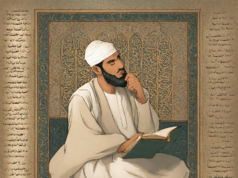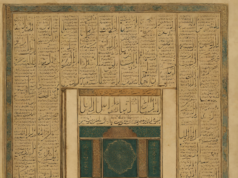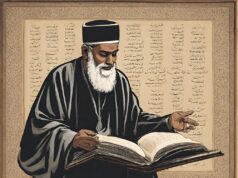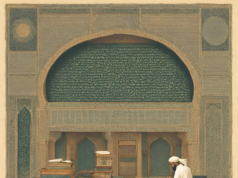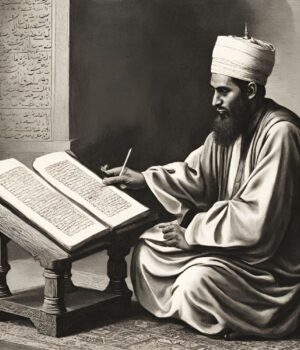
A study into the fabrication of the narrations attributed to the Imams of the Ahlul Bayt (as).
To understand the word “ghuluww” from both Quran and narrations, please refer to this article.
There were groups of exaggerators (Ghulat) and fabricators during the times of almost all Imams (as). According to some researchers, these could be divided into three main groups.
GROUP 1: The enemies of Ahlulbayt (as), who would serve the oppressive governments by fabricating exaggerated narrations regarding the virtues of the Imams (as) so as to bring blame and censure on the followers of the Imams (as) for being extremists and cause them to be accused of having become unbelievers.
GROUP 2: The people who wanted leadership and to make the prohibited pleasures permissible, these people fabricated narrations to attract the naïve followers of the Imams (as) towards themselves.
GROUP 3: These were the excessive and sentimental lovers of the Imams (as) who would either fabricate exaggerated traditions or just spread the already fabricated traditions without pondering about their authenticity.
These different groups would get into the circles of the companions of the Imams (as) and would get hold of their books, with the purported aim of copying them. These books had the collections of authentic narrations of the Imams (as). After getting these books, these fabricators would concoct traditions and insert them in the newly copied manuscripts that were then spread to various places and, as a result, these false traditions became distributed amongst the public at large with their attribution to the Imams (as). In those days, there were no printing presses and the manuscripts used to be written down by copyists and there was hardly any opportunity to compare the copied work with the original in order to verify that there had been no additions or subtractions. People who gained access to these copied manuscripts assumed that all the narrations reported in them were true and in harmony with the original manuscripts.
After getting these books, these fabricators would concoct traditions and insert them in the newly copied manuscripts that were then spread to various places and, as a result, these false traditions became distributed amongst the public at large with their attribution to the Imams (as).
Here we would give some example from the books of history and the books of Ilm al Rijal.
(1) In the book “Kamal ud Deen wa Tamam un N’ema”, while answering one of the questions of the Zaydiyya sect about why, in spite of the presence of Imams (as), there was/is so much difference among the Imamiyya Shia themselves, Sheikh Saduq writes:
So I say, relying on the Almighty Allah: The difference between Imamiyah is from those liars who, like in every period of time, entered their folds till the problem became serious. The elders of Shias were pious, striving and they referred to the righteous people. They never had personal views and could not discriminate (between authentic and fabricated traditions). That is why they accepted traditions from and trusted even those who had concealed their identity. When this went on increasing and the reality became known to the people they complained to their Imams about it, so the Imams ordered them to take (only) those traditions and narrations that are accepted by all. But they did not do so and continued in their previous attitude. Thus betrayal was from their side and not from their Imams. The Imams also did not become aware of the false and true traditions that had got mixed as they were not having the knowledge of the Unseen (ilm al ghayb). He (i.e The Imam a.s) is a righteous slave of Allah having knowledge of the Book and Sunnah and among the traditions of Shias he becomes familiar only with those that reach him. (Kamal ud Deen, Sheikh Saduq, Pg 112).


(2) In Uyun Akhbar al Ridha, of Sheikh al Saduq, In a narration Imam Ridha (as) warns one of his companions about the kinds of traditions fabricated by his enemies.
…..Ibn Abi Mahmood added, “I told Al-Ridha (s), ‘O son of the Prophet of God! There are traditions with us about the nobility of the Commander of the Faithful (s) and the nobilities of you – the Members of the Holy Household – which I do not observe in you. Should we believe in those traditions?” The Imam (s) said, ‘O Ibn Abi Mahmood! My father (s) narrated that his father (s) quoted on the authority of his grandfather (s) that God’s Prophet (s) said, ‘Whoever listens to someone’s speech is worshiping him. If the speaker is talking on behalf of God, then he has worshipped God. However, if the speaker is talking on behalf of Satan, then he has worshipped Satan.’’
The Imam (s) then added, ‘O Ibn Abi Mahmood! Our enemies have faked three types of traditions regarding us, which are of the following types: 1- Exaggeration 2- Belittling and 3- Wickedness of our enemies and swearing at them. When the people hear their traditions exaggerating about us, they will denounce us and say that the Shiites believe in the divinity of their Divine Leaders. When they hear their traditions belittling us, they will believe them. They will swear at us – the Members of the Holy Household – when they hear the traditions about the wickedness of our enemies and their being sweared at, while the Honorable the Exalted God has said, ‘Revile not ye those whom they call upon besides God, lest they out of spite revile God in their ignorance….’” (6:108). (Uyun Akhbar al Ridha, Arabic text, Volume 1 Ch 28)


(3) Abu al Khattab: One of the worst groups among such groups was called the “Khattabiya”. In the time of Imam al Sadiq (as) there was a man called Abu al-Khattab, who called Imam al Sadiq (as) God and claimed prophethood for himself. His group fabricated hundreds if not thousands of narrations, some about the exaggerated status of the Imams (as), some allowing the impermissible things, and some twisted interpretations of the Quranic verses.
In order to gain esteem and stature for himself in the eyes of the public, Abu al Khattab would go to Madina to meet Imam Sadiq (as) and after that fabricate hadith praising himself and attribute them to the Imam (as).
For instance, it is reported in Rijal al Kashi, that Abu al Khattab fabricated a hadith and attributed it to Imam Sadiq (as) in which the Imam supposedly put his hand on the chest of Abu al khattab, and said “We (Ahlulbayt) have the knowledge of unseen (ilm al ghayb)” and said that “Abu al khattab is the treasure of our (Ahlulbayt’s) knowledge and he is the place where all out secrets are housed”. When the Imam (as) was informed about this, he totally rejected the incident and said “By Allah except whom there is no God, we do not have the knowledge of unseen…..” (Rijal Kashi, chapter about Abu al Khattab)


Abu al Khattab and his group would twist the meaning of the Quran, for example there is a hadith reported in Rijal Kashi and Bihar al Anwar and other books which say that Imam Sadiq (as) supposedly said “We are the Salat in the Quran, we are the Zakat in the Quran, we are the Sawm in the Quran and we are the Hajj in the Quran……and we are the Ka’abah of Allah and we are the direction towards the face of Allah, such that wherever you turn, you will see the face of Allah……and our enemies in the Quran have been given the terms such as Fahsha (illicit relationship), Munkar (immoral and unethical), Baghi (rebel), Khamr (intoxication), Maysar and Qimar (gambling), Maytah (carrion), Dam (blood) and pig’s meet”. Surprisingly these kinds of narrations have been quoted by some grand scholars in their books too, although there are clear narrations which deny such traditions.
For example in Rijal Kashi, after repeating all these things, Imam (as) says “This is not the case and it is not the custom of Allah (swt) to speak with his creation by the use of words and address them in a manner such that they would not comprehend or understand” (Rijal Kashi, chapter about Abu al Khattab)


And there are many more narrations which totally reject this type of twisting of the verses of the Quran.
(4) Mughira bin Sa’eed: Another person who would fabricate ahadith was Mughira bin Sa’eed.
In Rijal Kashi:
Imam al Ridha (as) says: “Mughira bin Sa’eed attributed lies to Abu Jafar (Imam Baqir (as))….”
Imam Sadiq (as) says: “May the curse of Allah be on Mughira, he attributed lies to my father…..May Allah curse those who say about us what we have not said about our own selves.”
Imam Sadiq (as) says: “Do not accept any narration except that which is in line with the Quran and Sunnah, or what you find in the narrations of the previous Imams (as), because Mughira bin Sa’eed, may curse of Allah be on him, inserted such narrations in the books of the companions of my father (Imam Baqir (as)) which he (as) had never said…..”
Yununs ibn Abd al Rahman was a great scholar and a companion of Imam Ridha (as), he travelled to Iraq and found the followers of Imam Baqir (as) and Imam Sadiq (as), he heard ahadith from them, recorded them and also obtained some manuscripts from them and copied them too, when he returned from Iraq he met Imam al Ridha (as) and presented those compilations of ahadith to Imam al Ridha (as) for authentication. The Imam accepted to undertake the task and went through the ahadith carefully. The outcome of Imam’s (as) study was that a major portion of those narrations were false and fabricated. Imam Ridha (as) said: “These ahadith are not from Imam Sadiq (as) and without a doubt they have been attributed to the Imam (as) by Abu al Khattab, may God’s curse be on Abu al Khattab, that till today in the works of the companions of Imam Sadiq (as), the followers of Abu al Khattab who are shrewd and deceptive are able to insert false ahadith into these manuscripts. You should not accept any hadith that is attributed to us if it is in conflict with the Quran because whatever we say is in harmony with the Quran and Sunnah of the Prophet (saww) as we only narrate from God and his messenger.” (Rijal Kashi, chapter about Mughira bin Sa’eed)


And there are many more such narrations which explicitly say that Abu al Khattab and his followers secretly inserted fabricated narrations in the books of the companions of the Imams (as), such that even Ilm al Rijal is not enough to identify such narrations, because the names of these fabricators do not come in the chain of the narrators, hence we need to turn all the narrations back to the Quran and see if they agree with the Quran or not.
Such things continued even after Abu al Khattab, other fabricators like Mughira bin Sa’eed, Abu Samina etc kept fabricating traditions during the lives of all other Imams (as).
Some ahadith suggest that the Quran was changed and originally it had 17000 verses, some narrations suggest that the Imams (as) know everything from the past and the future from the time they are born, some suggest that Imams (as) created the universe and they still manage all affairs, and many more such bizarre traditions which go totally against the Quran and established Sunnah.
Another narration from Imam al Sadiq (as) suggests that Mughira bin sa’eed fabricated narrations of exaggeration (Ghuluw).
Imam Sadiq (as) says: “Mughira consistently and intentionally used to attribute lies to my father by borrowing the books of the companions of my father through the intermediary of his followers who concealed their true identity. They would take the manuscripts of the companions of my father on a loan and give them to Mughira. Then, he would secretly insert the beliefs of unbelievers and zindiq (heretics) and attribute them to my father. These copied manuscripts containing the wrong beliefs were given to his companions and he would instruct them to distribute them widely among the shias. Therefore all that which is of an extremist tendency (Ghuluw) in the works of the companions of my father is in actuality fabricated hadith reports that were inserted by Mughira and his followers.” (Rijal Kashi, chapter about Mughira bin Sa’eed)


An important point is that the same fabricated books of the companions of the Imams (as) were used by Sheikh Kulaini, Sheikh Saduq etc to compile the main shia books of hadith, therefore many fabricated narrations found their way into the main shia texts. This is why we find so many contradicting narrations, some ahadith suggest that the Quran was changed and originally it had 17000 verses, some narrations suggest that the Imams (as) know everything from the past and the future from the time they are born, some suggest that Imams (as) created the universe and they still manage all affairs, and many more such bizarre traditions which go totally against the Quran and established Sunnah.
Appreciation: Thank you to the Shia Reformist website for sharing some of its resources with Al-Islaah.org to publish on this website.

